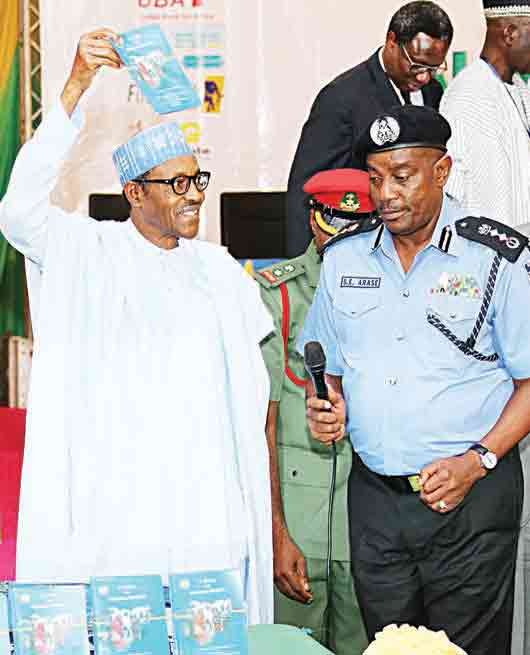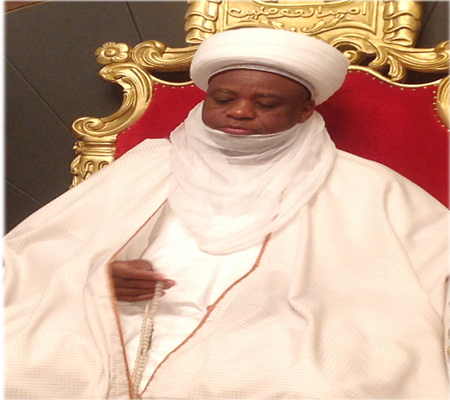• IGP seeks implementation of Police Trust Fund • Recommends citizens-driven security model
• Sultan urges confiscation of stolen assets • Arrest offenders, not parents, says Orji Kalu
PRESIDENT Muhammadu Buhari disclosed Monday that the Federal Government would recruit additional 10,000 police men and establish an anti-terrorism multi-agency Joint Task Force (JTF). It would also ensure the installation of close circuit monitoring cameras in major cities of the country.
On his part, the Inspector General of Police, Solomon Arase has called for the resuscitation of a proposed bill and a legal instrument that would compel corporate organisations and institutions in the country to remit funds to a Police Trust Fund. Buhari and Arase spoke yesterday in Abuja at a national summit on security.
It was organised by the Nigeria Police in collaboration with the Sun publishing company, with the theme “Community Partnership Approach to Internal security and Crime Management.”
The President stated that the task of addressing social vices in the society, which is mostly as a result of youth unemployment, was not just the responsibility of parents, teachers and community leaders, but also of the government. ‘‘It is the acknowledgement of this that I have identified youth empowerment, as one of the cardinal objectives of our administration, in furtherance to this the Federal Government is planning to employ at least an extra 10,000 police officers.”
Buhari said the threats posed by the current security challenges to the progress of the nation calls for the summit, as “the need for community input to policing and crime management in Nigeria” has become more imperative.
Noting that “effective policing of a society is dependent on the level of security consciousness of the citizens and the strength of the understanding that exists between the policing agencies and the community, this explains why it is generally acknowledged that no police force in the world no matter how well motivated, equipped and trained can successfully operate without the acceptance and support of the various communities.”
He said the Federal Government will “establish a properly trained and equipped federal Anti-Terrorism Multi Agency Task Force (ATATF), that will effectively address the challenge of future insurgency in a sustainable manner. “In the mean time efforts are being made to enhance the operational capacity of officers of the Nigeria police through a tailor made training programme that will give them the right civil orientation in their roles as guardians of the constitution.”
He also commended the efforts of the Inspector General of Police (IGP) in listening to the yearnings of the people to dismantle roadblocks across the country and substituting them with more effective patrol vehicles to make up for the removal.
He further stressed: “The commitment of the police leadership to uphold and enforce Chapter 4 of the constitution and commit officers of the force to the adherence to all United Nations and African Union charters and other regional global instruments on human rights, while also introducing alternative dispute resolution functions,” is noted.
Stating that the initiative to discourage prolonged pre-detention of citizens before proper investigation, the practice of intelligence led policing and other well-articulated projects, “if properly implemented will undoubtedly address those factors that threatened public confidence in the police.
And hence create good grounds for the practice of community led policing to flourish, I’m tasking the police not only to say, but to do, as we are promising Nigerians. In his opening address, Arase said the whole idea of the summit is to encourage “the spirit of Police-Community partnership as a strategy towards addressing our crime and national security challenges.”
Arase said the concept of “citizen-driven policing model” has helped other countries develop an effective partnership, which was used in tackling similar challenges when they confronted them.
He said the strong social control the traditional institutions have on the communities would be effective in crime control, noting that Plateau State model where Christians are engaged to secure their Muslim brothers and sisters while they pray and Muslims secure the Christians while they worship, is an example of community driven crime management.
He noted as well, the citizen driven internal security model in the Northeast geopolitical zone, where youths with the support of different components of the local communities, volunteer to complement the state, forming vigilance groups to defend the community against terrorists.
He remarked that the dwindling budgetary allocation to the police, inadequate manpower profile and weak logistics base as well as the challenges of insecurity in the country will be best addressed through citizens-driven policing model. “The model will ensure public ownership of the police, engender police accountability and ensure citizen’s commitment to national security.
It will address the manpower deficiency challenge in the police force as every citizen plays the role of a police officer with active stake in community safety.”
Arase said improved funding for the police would enhance operational efficiency as well as effective service delivery. “Through effective funding, the welfare needs of police personnel will be met and the challenge of corruption that has eroded professionalism and public respect fro police officers will be addressed.
Consideration may be given to the resuscitation and passage of the Police Trust Fund (Establishment etc) bill which has been pending in the National Assembly since 2002.
Like the ETF, bill seeks to tax corporate entities in order to complement the federal government in funding the Police,” he said. Also at the event, the Sultan of Sokoto, Sa’ad Abubakar III, urged Buhari to ensure that the Federal Government jails and confiscates all assets of those found guilty of embezzling public funds.
In his keynote address, Abubakar assured the president that traditional rulers in the country are in full support of his anti-graft fight. He recalled that in the old Sokoto Caliphate, corrupt elements, especially employees of the caliphate, were dealt with.
However, the former governor of Abia State, Orji Uzor Kalu, also advised the President to go after corrupt officers instead of their relations.
In his goodwill message at the summit, the Publisher of the Sun Newspaper noted that corruption is bad and that anyone found to be corrupt should be prosecuted accordingly.
However, he advised: “Unlike others before you, Mr. President, if a governor is corrupt and you cannot go after him because he has immunity, don’t go after his mother, go after the person that commits the crime.”TheGuuardian














